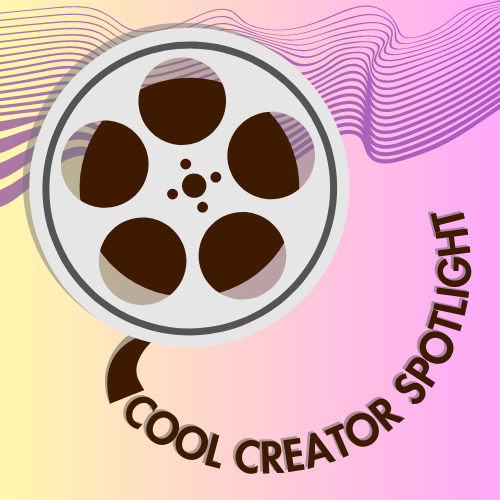Cool Creator Spotlight: Techmoan
Have you ever wondered how to fix old electronics, had a question about an obsolete/obscure media format, or just wanted to learn how audio-visual technology works? Techmoan on Youtube has a bewildering back catalogue of oddities which might interest you!

How does magnetic tape actually work? This video demonstrates a neat little device which shows the magnetic recording visually! The preview image gives a lot away, but there's much more explanation about how different kinds of tape are recorded.
Here's an odd device using 8-track cartridges to run a quiz machine. There is also some DIY tape repair advice if the foam pads inside your cassettes have disintegrated over time. We've all been there, right? And how does an 8-track work, anyway? It's an infinite loop, but you can also select different programs on the fly? There's a basic explanation included.
How about an absurdly massive cassette for very narrow tape likely used to play background music? He's demonstrated many BGM systems on tape and vinyl, but this one also delves into machine repair and the troubleshooting process.
Wait, there's new music on an Edison cylinder? The hipster cred just doesn't get any higher than this! And as a bonus, you can learn more about the first successful music recording technology.
But what about the really weird stuff? How about audio recorded on a wire?
And that's just a quick glance at audio technology. He also shows video equipment, camera systems, and more. Check it out if this tickles your fancy at all.

What do you think of physical media in this day and age? Do you still buy music on CD or vinyl? What about DVD and Blu-Ray film? Do you have an interest in odd physical formats, and is the rest of the world moving on to the digital realm of MP3 vs. FLAC, or is that already rendered irrelevant in a world of streaming media?
Cool Content Creator: Wesley Treat

It is likely that all the media we possess today will become unavailable even faster than VHS tapes, so ubiquitous back in the 90s. I still have DVD's from a showing of 'Oklahoma' my eldest played a lead role in back in the day, but I have no DVD player and have but my proud memories of his amazing singing voice. We continually see tech advance making prior formats obsolete, and media even more so. I can still play MP3's I collected decades ago, despite the CD's I ripped them from no longer having any way to be played on my setup.
The advent of .webp and .avif make me sad, because I have no app other than my browser that reveals the image. That, in fact, concerns me, because by making new formats and not making new apps to use and edit them, TPTB can leave us unable to make memes or share our own media, leaving us only propaganda.
Thanks!
I bought a USB DVD drive to access physical media on my laptop. I, too, hate the growth of .webp files online. But there is a growing interest in open source. We may prevail in the face of IP control freaks.
Something that is affecting the issue of media formats is also evident across the spectrum of standards promulgated by agencies, boards, and councils that are charged with regulation: regulatory capture. From law enforcement agencies, to medical boards and hospitals, to media standards, highly financially endowed corporations are corrupting such agencies to favor standards producing flows of funds and power to the corporations.
IMHO we need to decentralize such regulatory standards. If Hive proves nothing else, it proves that the community is able to discuss, agree, and fund the acceptance of standards, with voting cryptographically secured from tampering and verifiable by the voters themselves, which obviates boards and councils that were necessary to represent users in the days of the Pony Express, before encrypted electronic communications enabled the entire world to confer and decide such matters themselves.
We cannot be bribed to vote against our freedom and prosperity, and it is demonstrable that representatives are hopelessly incapable of resisting graft to be incorruptible.
ASME & SAE standards are non-governmental. UL (Underwriters Laboratories) is non-governmental. We don't need to point out obs ure technological projects most people don't understand to show how voluntary projects succeed and provide robust decentralized solutions.
FLAC is FOSS.
Linux runs the internet already.
Podcasts and independent media can crush legacy media in reach.
We are in many ways standing at the tipping point. Political overreach and corporate power are both growing, but also belong undermined at innumerable points. We don't need a violent overthrowing, we need a quiet realization they are unnecessary. Crypto might be the last piece of the puzzle, and it's just a matter of time before it displaces government fiat.
As long as cryptos depend on the physical infrastructure owned by corporations, that will only be as possible as corporations want it. Nothing more than censorship, which can be implemented with utter facility on privately owned infrastructure, is necessary to eliminate any financial value of every crypto.
Congratulations @jacobtothe! You have completed the following achievement on the Hive blockchain And have been rewarded with New badge(s)
Your next target is to reach 52000 upvotes.
You can view your badges on your board and compare yourself to others in the Ranking
If you no longer want to receive notifications, reply to this comment with the word
STOPCheck out our last posts:
This is quite interesting stuff! I didn't watch everything, but what I saw was intriguing. Buying LP recordings was a big deal when I was in high school and college. Then cassettes moved in and took over, just like his chart shows, and then CDs. I own some of each at this point, and listen to them from time to time. I can't play cassettes in my latest car, alas, but I can listen to CDs there, and at home. I haven't bought an LP or a cassette in years, unless maybe at a thrift store if I saw something nostalgic. I still purchase new CDs from time to time. I haven't really gotten into streaming music on my computer or phone.